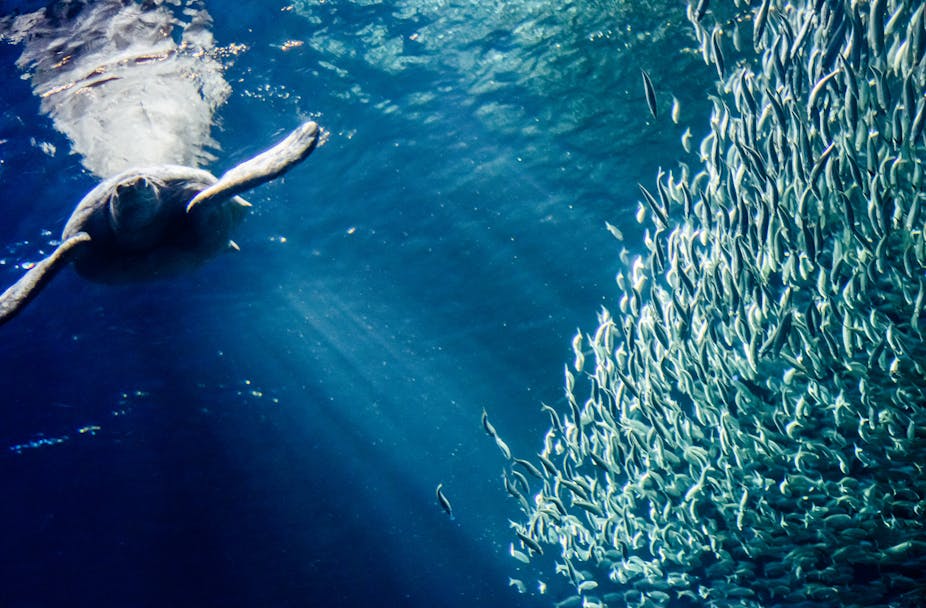The ocean we want is one that plays a key role in solving humanity’s three main global issues: protecting biodiversity, creating a sustainable economy and regulating climate. The ocean today moderates climate change, absorbs a significant fraction of our CO2 emissions, hosts valuable biodiversity and provides food to millions.
But all of these services are threatened by pollution and human activities. If we continue business as usual, the natural capital represented by the ocean is set to decline.
In June 2017, UNESCO’s Intergovernmental Oceanographic Commission (IOC) adopted a resolution to propose an “ocean decade”. In December of the same year, the United Nations General Assembly proclaimed that 2021-2030 would be the Decade of Ocean Science for Sustainable Development.
The IOC was tasked to coordinate the Ocean Decade, with implementation happening through collaboration between all interested and relevant parties in the UN system and beyond. The bold vision is “the science we need for the ocean we want” and the mission is “to catalyse transformative ocean science solutions for sustainable development, connecting people and our ocean”.
What are these solutions and how can they be developed to achieve the “ocean we want” by 2030?
Transforming our relationship with the seas
A momentous transformation in our relationship with the ocean is required if we are to achieve the stated outcomes of the Ocean Decade of a clean, healthy, resilient, productive, safe, accessible, inspiring and engaging ocean. But some promising ocean solutions that benefit people, nature and the economy have already been identified.
Regenerative ocean farming involves focusing on species such as shellfish and seaweed that do not require active feeding. Seaweed farming is well developed in parts of Asia but not globally. A practical example in the United States is the Greenwave initiative, spearheaded by Bren Smith, a fisherman turned restorative ocean farmer. With limited investment, he has created a profitable business combining kelp, clams, scallops, mussels and oysters. The vision is that this approach can be scaled up with neighbouring farms collaborating on hatcheries, processing and science support.

Sustainable management of existing fisheries and finfish mariculture is also needed and should not be neglected. It requires political action supported by shared data, information and science. However, it is the scaling up of unfed mariculture for food and animal feed that can really become a game changer for the future role of seafood in feeding the world.
Combining practical farming approaches with scientific testing of species, analysis of nutrients and contaminants holds great promise.
Ocean transportation and renewable energy
In addition to fisheries and aquaculture, ocean transport is a key global economy sector. Just like seafood in comparison to land-based food, ocean-based transport has a considerably lower environmental footprint than land- or air-based transport. Still, with global trade increasing, the reduction and ultimately elimination of related greenhouse-gas emissions is imperative. Battery-electric near-shore ferry and short sea shipping solutions are already proven and hydrogen fuel cell based solutions for such applications are emerging.
For deep sea shipping, an exciting possibility is to power the ships with ocean-based renewable energy. Based on geophysical, technical and economic potential, offshore wind is set to increase at least 40-fold by 2050 compared to 2018 – without any subsidies. Some of this electricity can be converted to hydrogen and ammonia at offshore fueling stations used by ships. This may seem like science fiction, but several industry-led projects are on the way, notably in the North Sea. Speeding up innovation to realise these opportunities early enough to avoid global climate crisis should be a priority.
In addition to potentially delivering a substantial portion of the global protein and nutrient supply to the world, powering marine transport and also activities on land, the ocean also holds other opportunities. Coastal protection against storms and tsunamis by maintaining and restoring mangroves also stores carbon, as does other kinds of blue forests, i.e. seagrass, salt marshes and kelp.
Protected marine areas have a proven track record of both conserving biodiversity and ensuring the sustainability of commercial fisheries nearby. Coastal tourism is contingent upon clean and attractive ocean and coastal regions, after all, and conserving them positively impact human well-being.
Common to many of these issues is that they cannot be dealt with in isolation. Rather, there is a need for an integrated, science-based approach. For example, offshore wind holds great promise, but should be located where it does not conflict with other uses. And the ocean needs to be protected from land-based pollution in order to be able to deliver its services. The cumulative impacts of a series of human activities must be considered together in an ecosystem-based approach.
Planning and working together
Providing science support to sustainable ocean planning is an overarching challenge to the science community. I would contend that a revolution is needed and on its way, not only in technological innovation for energy, food or transport, in biogeographic characterisation of the ocean environment, including its biodiversity, but also in the way we orchestrate the entire science-policy-society interface.
If we are to manage seafood production sustainably, mitigate climate change, stem biodiversity loss, seize opportunity for economic recovery and manage the ocean holistically, there is a need for a series of scientific revolutions. Some are well on their way, but more are needed. The Ocean Decade is a once-in-a-lifetime opportunity for all ocean scientists. It is a framework that does not in itself guarantee scientific progress, but the ocean challenges and opportunities have never been larger than they are today. We should not miss these opportunities.

For 60 years, UNESCO’s Intergovernmental Oceanographic Commission (IOC) promotes international cooperation and coordinates programmes in marine research, services, observation systems, hazard mitigation, and capacity development in order to understand and effectively manage the resources of the ocean and coastal areas.


